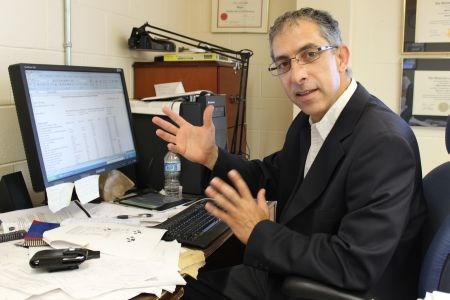An estimated one-third of the world's population is exposed to tuberculosis (TB), with 1.7 million people dying of the infectious pulmonary disease annually.
But after developing a new TB diagnostic test kit, Dr. Mazen Saleh is hoping to put a dent in those numbers — and kickstart a new biotechnology sector in the North while he's at it.
The Laurentian University biology professor has been moonlighting as president and CEO of Mycovar Biotechnology Corp., his newly created Sudbury-based company designed to market and produce Target-TB, which can detect the presence of tuberculosis in patients faster and more easily than current tests.
“It's cheap, it's simple, no instrumentation is required (to read it), and you get results within 15 minutes,” Saleh said.
A highly infectious disease caused by one of several airborne strains of mycobacteria, TB is rare in North America, thanks to modern sanitary conditions and accessible health care.
But it remains endemic in the world's developing countries, such as Africa, India or China, where transmission, through droplets from a cough or sneeze from an infected person, can result in a lengthy illness.
“This bacteria that causes tuberculosis is a nastier bug than a typical bug,” Saleh explained. “If you do get infected, the antibiotic treatment course is typically three to six months, it has a lot of side effects, and it's expensive.”
Target-TB takes only a few minutes to administer and works in similar fashion to a home pregnancy test. A blood sample is taken from the patient, mixed with saline and run through the test kit. Within 15 minutes, the results appear: three lines means the patient is positive, one line means he's negative.
Saleh believes a third option — the appearance of two lines — is the biggest improvement on the purified protein derivative (PPD) test, which is the current gold standard for TB testing.
With the PPD test, because the antigens used have much in common with other bacteria found in the natural environment, the test often shows exposure to the pathogen even when there isn't any, resulting in a false positive.
The two lines in Target-TB indicate a patient has either been vaccinated or has built up a natural immunity to TB, which is common in health workers who come in frequent contact with infected patients.
“We don't get vaccinated in North America, but in Africa, India and Asia, they still vaccinate schoolchildren for TB,” Saleh said. “With the PPD test, if you're vaccinated, you will test positive for the disease, and you can't tell if you've been vaccinated or you have the disease.”
Saleh, who came to Laurentian in 2004, has worked on the technology for a decade, based on his research on pathogensis, or how microbes cause disease. He believes the technology used to develop Target-TB can be adapted to test for other infectious diseases, such as malaria and hepatitis.
In addition to contributing $17,000 of his own resources to the project, Saleh has received financial support from the National Research Council and $100,000 from the Northern Ontario Heritage Fund Corp. (NOHFC), but more funding is required before he can move forward.
“I'm not a businessman, I'm a scientist,” Saleh said, noting that his first priority is his teaching duties at the university. “So it's a very slow process for me.”
Saleh conceded that his Northern Ontario location means he faces limitations when it comes to accessing the funds and influence needed to push the project to the next step, but believes if he's successful, it could mean a further expansion of the North as a health sciences research centre.
“I think this would be good to create a new sector, a biotech sector in Northern Ontario — a mini-hub, so to speak,” he said.
Though he proposes it somewhat playfully, Saleh envisions Northern Ontario forming, with Toronto and Montreal, a research triangle similar to that in North Carolina, whose research resulted in the revolutionary AIDS treatment drug AZT and is now a major attraction for business.
With the support of the City of Greater Sudbury, other biotechnology firms could be encouraged to locate to the area, creating more employment and another industry beyond mining and education, Saleh said.
Endorsement of Target-TB from the World Health Organization (WHO) is the biologist's ultimate goal. Accreditation would make Saleh's diagnostic kit the standard for TB testing worldwide. The WHO has acknowledged his work, providing samples from its blood bank to do further testing, and Saleh is waiting for feedback.
It's been a lot of work, but Saleh is determined to see the project through.
“I don't want to let go of it,” he said. “If it can really help in any way, I would not be able to live with myself knowing that I could have done something but I just ignored it.”




